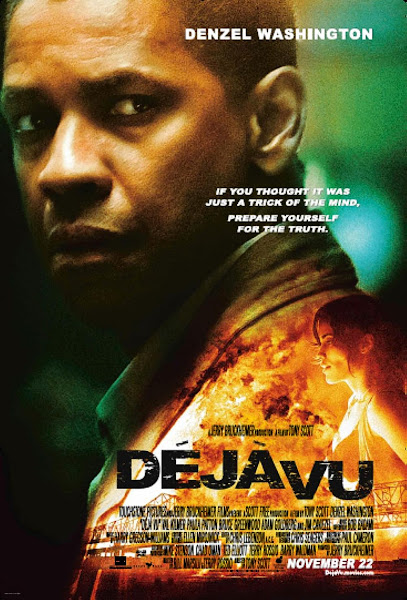Déjà Vu (2006 Film Review)

2006 Buena Vista Pictures
Directed by: Tony Scott; Written by: Bill Marsilii and Terry Rossio
Starring: Denzel Washington, Val Kilmer, Paula Patton, Bruce Greenwood, Adam Goldberg, and Jim Caviezel
MPAA Rating: R; Running Time: 126 Minutes
The Nicsperiment Score: 8/10
A ferry in New Orleans explodes, killing over 500 people. A woman named Claire washes up dead on the banks of the Mississippi with burn wounds that came before the explosion. Enter ATF Special Agent, Doug Carlin, whose insight into the case catches the attention of the FBI. The bureau invites Doug to join a new experimental unit investigating the bombing. The new unit tells Doug they're using state of the art satellite surveillance technology that allows them to get a 360 degree look at any event that has happened exactly 4.5 days ago. However, as Doug becomes obsessed with the footage, slowly falling in voyeuristic love with the still alive Claire, he intuits his way to a shocking discovery: the experimental unit has actually discovered a window back in time. Now Doug doesn't just want to solve the crime...he wants to stop it from happening.
Tony Scott might just be the poster boy for an artist not appreciated in their time. Constantly overshadowed by his brother Ridley, who directed such esteemed, visually resplendent classics such as Alien, Blade Runner, and Gladiator, Tony's films were frequently misunderstand, even if audiences often enjoyed them. 11 years after Scott tragically took his own life, his work is far more appreciated, and I think it is far past time to recognize the greatness of his late career foray into science fiction, 2006's Déjà Vu. Screenwriters, Bill Marsilii and Terry Rossio, bemoaned the choice of Scott as director, and Scott himself felt like he had failed the material, but the late auteur was being too modest. Déjà Vu is far from a failure. Instead, it's a brilliant melding of a high-concept time travel story with Scott's singular gritty and flashy style, resulting in something altogether satisfying and unique.
Perhaps under another director's grasp, Déjà Vu's myriad themes would have been more heavy-handed, and thus, more pleasing to critics. For instance, Carlin becomes so obsessed with the past, he loses sight of the present. Perhaps critics would have preferred if another character had lectured Carlin and told him, "What are you doing? You've become so obsessed with the past, you've lost sight of the present!" Instead, Scott implies these themes through the use of brilliant, thrilling visual storytelling, as in a sequence where Carlin races along the New Orleans streets in an armored vehicle, looking through a screen that transposes the world in front of him into that of 4.5 days before, as he carelessly smashes through traffic in the present day. Portraying the obsessed Carlin is the always excellent Denzel Washington, who again shows multifaceted mastery of his craft through his recurring partnership with Scott, in this, the third out of their five collaborations. In his previous Scott film, Man on Fire, Washington's character is also obsessed, yet in that film, Washington imbues his character with an unhinged, terrifying desperation, backed by an underlying sense of menace and a high level of competency. In Déjà Vu, Washington imbues his character with a much higher level of vulnerability, lower physical competency, and very little menace, though Carlin might cause even more collateral damage than Washington's character in Man on Fire. This kind of nuance, paired with a high level of charisma puts Washington in rarified air.
Several other fine actors round out Déjà Vu's cast, from the reliably intense and committed Jim Caviezel as the bomber, to a welcome Val Kilmer as a supervising FBI agent, to an authoritative Bruce Greenwood as the man in charge of the project, to a wonderfully nutty Adam Goldberg as the scientist behind the project, to a fresh-faced and lively Paula Patton as the object of Carlin's obsession.
I'll be the first to admit, at the time of their release, I didn't so much dismiss Scott and Washington's 21st Century collaborations as ignore them altogether, and as I go through them now, I really wish I hadn't. Scott's style meeting Marsilli and Rossio's screenplay might have resulted in disappointment from all three parties, but the actual cinematic result is a deep and emotionally satisfying experience, as these three actually brought out the best in one another. Déjà Vu also rewards repeat viewings, as there are just enough little Easter eggs scattered throughout the film to raise the question, "Wait...how many times has Carlin actually done this?" In time, with its subtle handling of its complex themes, oxymoronically through a delightfully loud style, perhaps Déjà Vu will come to be known as Tony's Blade Runner, or at the least, a wonderful film.


Comments